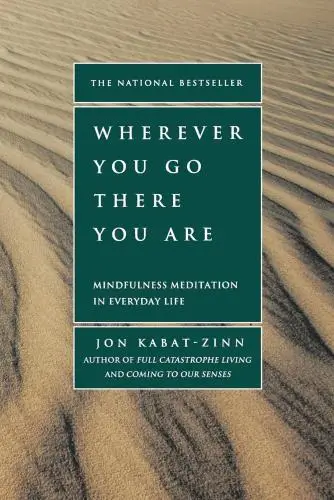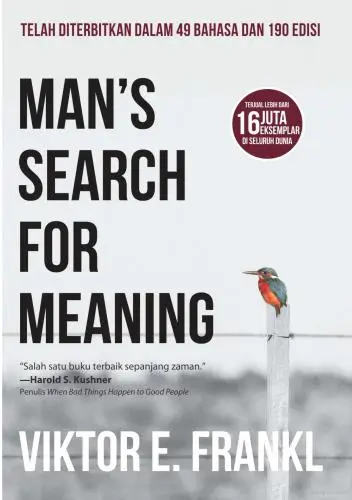
Think Like a Monk
Train Your Mind for Peace and Purpose Every Day
What's it about?
Think Like a Monk is a transformative guide that draws on the ancient wisdom of monks to help readers find peace, purpose, and happiness in their modern lives. Shetty shares personal anecdotes and practical exercises to help readers cultivate mindfulness, gratitude, and compassion. Through his teachings, readers can learn to overcome negativity, live with intention, and create a life of fulfillment.
About the Author
Jay Shetty is a former monk turned motivational speaker and author known for his insightful perspectives on personal growth, mindfulness, and finding purpose in life. His book "Think Like a Monk" offers practical advice on how to live a more fulfilling and intentional life. Shetty's writing style is engaging and relatable, making complex ideas easy to understand and apply to everyday life. His unique blend of Eastern wisdom and modern insights makes him a sought-after voice in the self-help genre.
10 Key Ideas of Think Like a Monk
Start Your Day with Purpose
Begin each day by setting a clear intention.
This means taking a few moments every morning to reflect on what you want to achieve and how you want to behave throughout the day.
The reasoning behind this tactic is that starting your day with a purposeful mindset helps guide your actions, keeps you focused on your goals, and reduces the likelihood of getting distracted by less important tasks.
Learn DeeperSet aside 5-10 minutes each morning for reflection: Before you dive into your daily tasks, find a quiet space where you can sit comfortably without distractions. Use this time to think about what you want to accomplish for the day and how you want to approach it.
Write down your daily intentions: Keep a journal or notepad specifically for this purpose. Writing down your goals and how you wish to conduct yourself not only makes them more tangible but also serves as a reminder throughout the day.
Visualize your day: After setting your intentions, close your eyes and visualize how you want the day to unfold. Imagine yourself achieving your goals and overcoming challenges with grace. This mental rehearsal can boost your confidence and focus.
Create a morning routine that supports your intention-setting: Incorporate activities that calm your mind and prepare you for the day, such as meditation, light exercise, or reading something inspirational. This helps create a positive mindset conducive to following through with your intentions.
Review and adjust your intentions nightly: Before bed, take a few minutes to reflect on your day. Consider what went well and what didn’t. Use this insight to adjust your intentions for the next day, learning and growing from each experience.
- Example
Example 1: If your intention is to be more patient with your colleagues, visualize scenarios where you might typically become impatient. See yourself handling these situations calmly, listening actively, and responding with understanding.
- Example
Example 2: Suppose you aim to focus more on your health. Your morning reflection could include setting specific intentions like choosing healthier food options, dedicating time for a 30-minute walk, and drinking more water throughout the day. Visualize yourself making these choices with ease and enjoying the benefits.
Practice Gratitude
Make it a habit to acknowledge and appreciate the good in your life.
You can do this through journaling or simply reflecting on things you're grateful for each day.
Practicing gratitude shifts your focus from what you lack to what you have, fostering positive emotions and reducing stress.
It also improves relationships by appreciating the value others bring into your life.
Learn DeeperStart a Gratitude Journal: Every night before you go to bed, write down three things you were grateful for that day. They can be as simple as a sunny day or a good cup of coffee in the morning. This habit helps you end your day on a positive note and trains your mind to focus on the good.
Express Gratitude to Others: Make it a point to thank someone every day. It could be a text to a friend thanking them for their support, a note to a colleague appreciating their help, or simply saying thank you to the barista who made your coffee. Acknowledging others' contributions not only strengthens your relationships but also enhances your own sense of gratitude.
Mindful Reflection: Dedicate a few minutes each day to reflect on the aspects of your life you're thankful for. This can be done during a quiet moment in the morning, on your commute, or while taking a walk. Think about the people, experiences, and opportunities that have positively impacted your life.
- Example
Imagine you had a particularly challenging day at work, but during lunch, a coworker shared an encouraging word that lifted your spirits. Before going to bed, you write in your gratitude journal about how thankful you are for supportive colleagues.
- Example
After a long week, a friend invites you over for dinner, taking the time to cook for you. Recognizing the effort and care behind this gesture, you send them a heartfelt message the next day expressing your gratitude for their friendship and the lovely evening.
Meditate Daily
Incorporate meditation into your daily routine to cultivate mindfulness and inner peace.
Meditation involves focusing your attention and eliminating the stream of jumbled thoughts that may be crowding your mind.
Regular practice enhances self-awareness, reduces stress, and improves concentration.
It serves as a foundation for developing other positive habits and attitudes.
Learn DeeperStart Small: Begin with just 5 minutes of meditation each day. Choose a quiet spot and a comfortable position. Focus on your breath, inhaling and exhaling slowly.
Set a Regular Time: Make meditation a part of your daily routine by doing it at the same time every day. Whether it's first thing in the morning or right before bed, find a time that works for you.
Use Guided Meditations: If you're struggling to focus or don't know how to start, use guided meditations. There are many free resources online and apps that can help guide you through the process.
Create a Dedicated Space: If possible, dedicate a small area in your home as your meditation space. This can be a corner of a room with a cushion or chair, designed to be inviting and calm.
Be Patient and Consistent: Understand that meditation is a skill that takes time to develop. Be patient with yourself and consistent in your practice. The benefits will grow over time.
- Example
Imagine setting your alarm 10 minutes earlier than usual to sit in a quiet part of your home, focusing on your breath and starting your day with a clear mind.
- Example
Consider using a lunch break at work to find a quiet spot outside or in an unused conference room, where you can spend a few minutes meditating to reset and refocus for the afternoon.
Cultivate Self-Discipline
Self-discipline is essential for achieving long-term goals and overcoming immediate gratifications that don't align with your values.
Develop self-discipline by setting clear goals, establishing routines, and practicing restraint in the face of temptations.
This tactic is crucial for personal growth, as it enables you to control impulses and make choices that lead to success and fulfillment.
Learn DeeperIdentify Your Core Values: Start by understanding what truly matters to you. This could be family, health, career advancement, or personal growth. Knowing your values helps in making decisions that align with your long-term goals.
Set Specific, Achievable Goals: Break down your long-term goals into smaller, manageable tasks. For instance, if you aim to improve your health, set a goal to exercise for 30 minutes, three times a week. Make sure your goals are specific, measurable, achievable, relevant, and time-bound (SMART).
Establish Daily Routines: Create a daily schedule that incorporates activities leading you towards your goals. This could include a morning routine of meditation, reading, or exercise. Consistency in these routines builds discipline over time.
Practice Mindfulness: Be present and aware of your actions and decisions. Before giving in to a temptation, pause and ask yourself if it aligns with your values and goals. This moment of mindfulness can help you make choices that support your objectives.
Seek Accountability: Share your goals with a friend, family member, or mentor who can hold you accountable. Regular check-ins on your progress can motivate you to stay on track and resist temptations.
- Example
If one of your core values is health, and you're tempted by unhealthy food, practice restraint by preparing healthy meals in advance and reminding yourself of the benefits of eating well, such as increased energy and better mood.
- Example
For someone aiming to advance their career, self-discipline might involve dedicating an hour each evening to professional development, such as taking an online course or reading industry-related materials, instead of watching TV.
Embrace Minimalism
Adopt a minimalist approach to life by simplifying your environment and focusing on what truly matters.
This involves decluttering physical spaces and reducing commitments that don't align with your values.
Embracing minimalism helps reduce stress, increase focus, and create space for activities and relationships that enrich your life.
Learn DeeperStart with your living space: Begin by decluttering your home. Go through your belongings and ask yourself if each item brings you joy or is necessary for your daily life. If not, consider donating or selling it. This process not only cleanses your physical space but also your mental space, making room for new, meaningful possessions and experiences.
Evaluate your commitments: Take a close look at your calendar. Are there activities, obligations, or even social events that don't align with your values or bring you joy? Politely decline or remove these from your schedule. This will free up time for what truly matters to you, whether it's family, hobbies, personal growth, or rest.
Practice mindful consumption: Before making a purchase, ask yourself if the item is truly needed or if it's an impulse buy driven by emotions or external pressures. This applies to everything from clothing to gadgets to subscriptions. Mindful consumption helps prevent clutter from accumulating again and encourages a more sustainable lifestyle.
Digital decluttering: Simplify your digital life by organizing your files, unsubscribing from unnecessary emails, and limiting your time on social media. This can significantly reduce stress and improve your focus and productivity.
- Example
Imagine you're going through your closet and come across a sweater you haven't worn in over a year. It doesn't fit well anymore, and you don't feel confident wearing it. Instead of letting it take up space, you decide to donate it to a local charity, making room for clothes that make you feel good.
- Example
You're invited to a weekly happy hour with coworkers, but you realize that these gatherings leave you feeling drained rather than energized. You decide to skip the next happy hour to spend time on a hobby you've been neglecting. This decision aligns with your value of personal growth and well-being.
Deeper knowledge. Personal growth. Unlocked.
Unlock this book's key ideas and 15M+ more. Learn with quick, impactful summaries.
Read Full SummarySign up and read for free!
Think Like a Monk Summary: Common Questions
Experience Personalized Book Summaries, Today!
Discover a new way to gain knowledge, and save time.
Sign up for our 7-day trial now.
No Credit Card Needed

Similar Books

This Is Your Brain on Joy
Earl Henslin
The Let Them Theory
Mel Robbins
Flight SQA016
Amanda Radley
The Almanack of Naval Ravikant
Eric Jorgenson
Wherever You Go, There You Are
Jon Kabat-Zinn
Tuesdays with Morrie
Mitch Albom
The Art of Happiness
Dalai Lama
Man's Search for Meaning
Viktor E. Frankl
Comprehensive Casebook of Cognitive Therapy
Frank M. Dattilio
Learning Habits
Sarah NichollTrending Summaries

Peak
Anders Ericsson
Never Split the Difference
Chris Voss
Smart Brevity
Jim VandeHei
The Psychology of Money
Morgan Housel
The First 90 Days
Michael D. Watkins
Atomic Habits
James Clear
Thinking, Fast and Slow
Daniel Kahneman
The Body Keeps the Score
Bessel van der Kolk M.D.
The Power of Regret
Daniel H. Pink
The Compound Effect
Darren HardyNew Books

Forex Trading QuickStart Guide
Troy Noonan
Comprehensive Casebook of Cognitive Therapy
Frank M. Dattilio
The White Night of St. Petersburg
Michel (Prince of Greece)
Demystifying Climate Models
Andrew Gettelman
The Hobbit
J.R.R. Tolkien
The Decision Book
Mikael Krogerus
The Decision Book: 50 Models for Strategic Thinking
Mikael Krogerus
Fichte
Johann Gottlieb Fichte
Do No Harm
Henry Marsh
